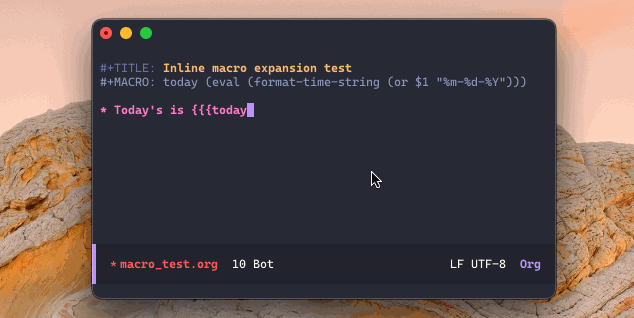In org-mode, macros can be used to expand text but are only visible when exported. However, by combining org-macro and emacs' built in font-locking system, you can expand macros inline in the buffer.

For example, here’s a macro that expands to the text returned by an elisp expression which gets today’s date. In the buffer, you don’t get to see the expanded value (though it does show up if you export it).
#+MACRO: today (eval (format-time-string "%m-%d-%Y"))
* Today's date is {{{today}}}
Adding the following to your init.el tells emacs to font-lock text in org-mode buffers when it sees triple curly braces. Using the display overrides the text shown when there is a match. Then the macro is expanded programatically the same way (for the most part) org-mode does it during export.
;; Display macros inline in buffers
(add-to-list 'font-lock-extra-managed-props 'display)
(font-lock-add-keywords
'org-mode
'(("\\({{{[a-zA-Z#%)(_-+0-9]+}}}\\)" 0
`(face nil display
,(format "%s"
(let* ((input-str (match-string 0))
(el (with-temp-buffer
(insert input-str)
(goto-char (point-min))
(org-element-context)))
(text (org-macro-expand el org-macro-templates)))
(if text
text
input-str)))))))
Now you can see the macro expansion inline in the buffer.
#+MACRO: today (eval (format-time-string "%m-%d-%Y"))
* Today's date is 2022-10-29
Links to this note
-
This is a work-in-progress as I’m still refining an
org-agendacentric workflow. Here’s what I’ve learned so far. -
Steven Wolfram - Seeking the Productive Life - Literary Notes
I read about Steven Wolfram’s personal infrastructure. He develops his approach to just about everything using the tools that he built. I’m guessing this approach works great for building Wolfram as a giant feedback loop but not directly transferable to others.